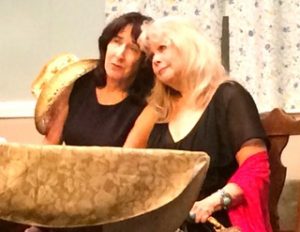Lack of Affectation Hobbles Lukewarm ‘White Chicks’
Carl Joe Bindler played a mean defensive tackle for the University of Texas in the 1960s, eventually winning the heart and hand of cheerleader Hannah Mae. He’s getting mileage out of his playing days even as he’s moved to New York state’s upper-crusty Westchester County — neighbor lady Maude Mix (and who knows who else) has already slept with him, fueling his wife’s neediness and helping set the course for solidarity between the girls.
And to boot, Maude’s husband Tyler guiltlessly leaves town every couple years to try out a new pair of sheets.
Maude and Hannah are the losingest among a legion of lost women whose marriages have outlived their usefulness. Even a blood oath won’t guarantee that the ladies’ friendship will last another few days.

Maude Mix (Elouise Potomac, left) and Hannah Mae Bindler (Liz Osmun) don’t know it, but they’re two peas in a pod. COURTESY PHOTO
While director Dave Sein exploits these differences pretty well, his casting to type could have been better. Beyond that, Noonan’s play is mostly toothless in its development, pushing us in and out of the action whether we like it or not.
Maude, an archetypal WASP sourpuss from Westchester’s Fox Hollow, devours books and women voter projects for fear of revealing the real her; she doesn’t dress on Wednesdays and mows the lawn after the sun’s gone down. “In Westchester County,” she sizzes at new neighbor Hannah, “we’ve earned the right to keep our distance” — against which the blathering Hannah fights harder to establish a relationship, duplicating Maude’s coffee recipe and quipping that locals call her the “brunette bomb” (odd, since her Dolly Parton tresses are obviously bleached).
The strange bedfellows wax stranger as Hannah moves in with Maude, a host of husband miseries strengthening their bond. A credit-card-fueled New York weekend follows, with the girls pledging to do it again every Friday even as Hannah sports a cast after a spat with Carl Joe. All at once, Maude is the picture of emancipation, the epicenter of liberated housewifery, throwing dishes and talking like a sailor in her unwitting attempt to out-Hannah Hannah.
… Noonan tells his tale rather than shows it…
Or is she? That’s the question the play asks amid each woman’s failure at feminist life.
I suppose the story is a good exercise for two women with obvious talent, but the dialogue and plot never rise to the level of a declaration one way or the other. That’s because Noonan tells his tale rather than shows it, with Hannah generally charting Carl Joe’s cheating ways versus the reasons behind them. Each woman is childless, with Maude lacking the love component and Hannah “the plumbing”; Noonan spends almost no time on the topic, whose expansion would have revealed a lot about the states of the ladies’ marriage and the ladies themselves.
Neither do the surrounding anecdotes fuel the characters during their timeline. Carl Joe’s Longhorns, for example, won a national championship in 1963; did he have a major hand in that on his way to capturing Hannah’s heart? Exactly what’s in the deflated shopping bags the ladies tote after their weekend, and why are there only two of them? I heard one faint f-bomb from Maude as she slams her kitchenware to the floor; where’s the wholesale, hard-earned potty-mouth, and what does Maude expect to drive home with plastic dishes versus breakable china? Sein and his assistant Mary O’Brien never create much of a crescendo, and each characterization suffers accordingly.

John Ford Noonan has a lot to say about a concept that’s passed him by.
Collin Walker’s set is quaint and tidy, the way things oughta be (and are, or else) in Fox Hollow. The rest of the tech speaks accordingly, although Audrey Prisk’s costumes don’t present any real challenges amid the characters’ polar opposites.
In the actors’ defense, it must be said that White Chicks was written in 1979, when America had nothing anywhere near modern feminism under its belt (even so, it’s still got eons to go). That’s the general explanation for this play’s dated look and feel — and although Osmun and Potomac have a handle on their characters, feminism as a concept left Maude and Hannah Mae behind a long time back. The audience may feel as much accordingly.
Martin Jones Westlin’s e-mail address is [email protected].
This review is based on the performance of Feb. 19. A Coupla White Chicks Sittin’ Around Talkin’ runs through March 5 at Point Loma Assembly, 3035 Talbot St., Point Loma. $16-$18. 619 800-5497, pointlomaplayhouse.com.

Martin Jones Westlin, principal at editorial consultancy Words Are Not Enough and La Jolla Village News editor emeritus, has been a theater critic and editor/writer for 25 of his 47 years…
More…
